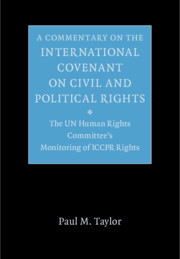 A Commentary on the International Covenant on Civil and Political Rights
A Commentary on the International Covenant on Civil and Political Rights Published online by Cambridge University Press: 11 June 2020
There is little doubt about the customary character of the prohibition against torture, and cruel, inhuman or degrading treatment or punishment. In addition to being a core component of the Universal Declaration and the Covenant, the prohibition is found in the Convention on the Rights of the Child (Article 37(a)), the International Convention on the Protection of the Rights of All Migrant Workers and Members of their Families (Article 10), and the Convention on the Rights of Persons with Disabilities (Article 15). It also received extensive specialist treatment in the 1984 Convention Against Torture and Other Cruel, Inhuman or Degrading Treatment or Punishment (Convention Against Torture), which led to State reporting to the Committee Against Torture, a source of inspiration to the Human Rights Committee when developing its revised General Comment 20 on Article 7.
To save this book to your Kindle, first ensure no-reply@cambridge.org is added to your Approved Personal Document E-mail List under your Personal Document Settings on the Manage Your Content and Devices page of your Amazon account. Then enter the ‘name’ part of your Kindle email address below. Find out more about saving to your Kindle.
Note you can select to save to either the @free.kindle.com or @kindle.com variations. ‘@free.kindle.com’ emails are free but can only be saved to your device when it is connected to wi-fi. ‘@kindle.com’ emails can be delivered even when you are not connected to wi-fi, but note that service fees apply.
Find out more about the Kindle Personal Document Service.
To save content items to your account, please confirm that you agree to abide by our usage policies. If this is the first time you use this feature, you will be asked to authorise Cambridge Core to connect with your account. Find out more about saving content to Dropbox.
To save content items to your account, please confirm that you agree to abide by our usage policies. If this is the first time you use this feature, you will be asked to authorise Cambridge Core to connect with your account. Find out more about saving content to Google Drive.